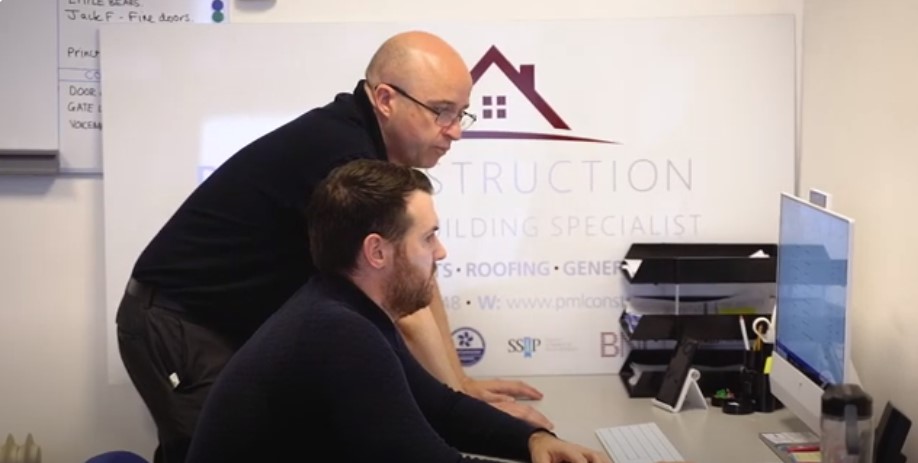You know your way around building plans and creating solid structural foundations, but how about a making a business plan for your construction company? Here, we’ll show you how a construction company business plan can provide business owners like you with a helpful roadmap to enable your business to grow and thrive.
What is a Business Plan for a Construction Company?
Think of a business plan as a roadmap for your construction company’s future. This plan is going to help you fill up your diary for the next few months. It’ll get your phone ringing with enquiries. With clever thinking, you’ll identify which construction jobs to focus on for maximum profitability and how to target your ideal customers.
Your business plan will hold the answers to your why, when, how and what questions. It’ll become your go-to reference point from now on.
It’s easy to get wrapped up in your daily work – checking you’ve got the right people, tools and construction materials for the current job. But taking time out of your everyday work to think carefully about your business’ future can really help long term.
Consider what would make a real difference to you and your business. Do you want to claim back more time for yourself? Do you want better cashflow? Do you want more clients? Creating an action plan will help with that. It makes you define your business goals (what you want to achieve), operations plan (how you work day to day) and marketing strategy (how you reach customers), and that will drive your construction company forward.
Discover why a business plan is so important
Why Do You Need a Business Plan for Your Construction Company?
“Not more paperwork,” I hear you cry! Taking time out of your day-to-day work today will pay dividends for your business tomorrow.
A business plan isn’t a wishlist for entrepreneurs. It details your company’s purpose – your ‘why’ – and states how you’ll achieve it.
Often, business owners create a business plan because they need investment and the bank or private investors ask for one. Understandably, investors want to see sound financial projections, business ideas and strategy.
But a business plan will really help to guide you as well. You’ll start basing business decisions on fact and logic rather than your instinct. Whether you run a new business start up, growing small business or established construction company, a well-defined plan will provide you with a roadmap for now and next.
In short, it’ll spell out:
- your ideal target market (eg do you want to get in with developers or directly with local homeowners?)
- your business’ strengths and competitive edge (what do you do best and which skills and experience should you shout about?)
- your daily operations plan and processes (which construction materials will you use? What about health and safety on site? Who’s the Project Manager? What’s the project timeline?)
- your cashflow (when’s money coming in and when’s it going out?)
- your roadmap to where you want to get to and how (do you want to increase profits, be more hands-off daily tasks, get booked up for three to six months?).
If all this sounds daunting, Phil Chantry Action Coach can help you with it. Book a call to talk it through.
Patrick Steppel, Managing Director, PML Construction, “I was a builder turned business man, not the other way around. So I’d built it up to a point and I needed a little bit of extra help to take it to the next level.
Action Coach holds you to account to get important jobs done that would normally just get put on the backburner because they’re not involved in the day-to-day running of the business. I needed that extra nudge to get us moving again.”
What are the Main Sections of a Construction Business Plan?
This process may feel overwhelming, but you can find helpful business plan templates online to guide you through the process. Your business plan outline should include:
 Executive summary – an introduction of what’s to come in the plan.
Executive summary – an introduction of what’s to come in the plan.
Company overview – what’s your company’s purpose, aims and business structure if you have a team?
Market analysis – define the construction industry landscape, your key competitors, market trends and opportunities. Who’s your target market of potential clients?
Construction services – specify which building construction services you offer and any speciality construction work that makes you stand out.
Sales and marketing strategy – your actionable marketing plan showing how you’ll promote your business to the right people to achieve success.
Management team – if you have one. Who works with you and is involved in decision-making?
Operations plan – outline your everyday processes and policies from recruitment of general contractors or subcontractors to purchasing construction materials or construction project management.
Financial plan – make definite financial projections for your business in the first year and beyond, including the income statement, balance sheet and cashflow statement.
10 Steps to Creating a Business Plan for Your Construction Company
Think about these logical aspects when you’re creating a plan that makes sense for you and your business. Here’s a step-by-step guide to creating your construction company business plan.

1. Personal goals – what do you want to get out of your business? What do you want to achieve for yourself? Is there something you want to get better at or maybe you want to claw back some time to yourself? Write down what you want for yourself.
2. Business goals – what are your aims for your business? Do you want to get 5* ratings on Google? Do you want to book in three new projects by the end of the year? Map out your long term goals and break them down into achievable short term goals for the next quarter.
3. Profitability – which construction jobs are the most profitable for you? Is it the big renovations or smaller repair work? Work out which jobs to go after for the best return.
4. Cashflow – do you know what money will be coming in over the coming weeks and months? What are your upcoming expenses? Be aware of your cashflow and plan accordingly.
5. Client satisfaction – are your customers happy with your work? Which areas could you improve on? Are they giving you positive reviews online? Do some market research to check what’s being said about your business.
6. Time management – are you stepping away from day-to-day tasks to manage your business? Are you getting time for your home life or is it all work, work, work? Plan your work-life balance well.
7. New business generation – how do people find out about you? Is it by word of mouth? Do you have a sales pack to send out to new enquiries? Are you online and on social media? Should you be advertising? Identify the most effective ways to get new clients.
8. Your team – do you have the right people in your company? Is it balanced? Perhaps you need some admin help. Would you benefit from more labourers or another specialist skilled worker?
9. Business systems – is your customer database up to scratch? Does your accounting software do what you need it to? Maybe your invoice process could be more efficient. Check you have the right support systems in place.
10. Next steps – plot the actions you need to take with deadlines. Make sure you’re accountable to somebody to ensure you complete them! If you need somebody to hold you to account and keep you on track, Phil Chantry at ActionCOACH is perfectly placed to do that.
Don’t feel daunted by the thought of creating a business plan. It can make a real difference to your business, and your life away from work (yes, you can actually have one!). These actionable steps will help you to assess what you need to do to better your business. And don’t forget that help is at hand if you need it.
Get Some Help With Your Business Plan
Philip’s helped many business owners like you to grow their companies. He can help you to become a success story too.
Tomasz Fledrzynski, Founder and Director of Wisent Construction:
“I would like to recommend Phil and his services to any growing or established businesses looking to review their processes and improve their productivity… After my sessions with him I feel that his input and guidance have made a real difference to the way I see my business and have pointed me in a right direction to grow my company further.”
Call Phil today to get some actionable help and advice – 07770 884297.
Get some one-to-one business planning help with our GrowthCLUB
How to write a business plan in six easy steps – our business plan template will get you started.




